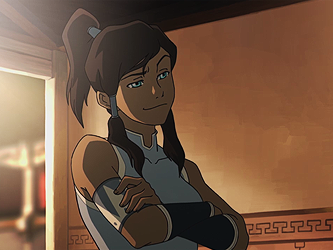
I think I can safely say I was not the only one who went into Avatar: The Legend of Korra with high expectations. Given the rather vehement reaction in the wake of the first season’s conclusion, many people not only shared those expectations but felt the show failed to deliver.
Let me be clear about something before I get into the nitty-gritty of this: I liked The Legend of Korra. The art direction is top-notch, the voice acting is great, the music is very well done, Republic City felt well-realized, pro-bending is a neat innovation – there’s a lot to like, here. The first season was good. It isn’t fantastic. It isn’t Last Airbender, and I think that’s why so many people are upset.
I can see why. The biggest problem Legend of Korra has is in its writing. And the biggest problem the writing has is in its characters. Don’t get me wrong: some characters are flat-out great, and others show great potential. But the show seems to have trouble bringing that out, because the plot keeps getting in the way of the characters’ development. With only twelve episodes in a single season to tell a ‘legendary’ story, things are rushed or overlooked in favor of moving the plot forward.
The problem with this is similar to driving a car with engine problems. You can get from point A to point B, sure, but if your transmission slips, your cylinders are misfiring, your spark plugs are dirty, and your oil filter’s clogged, it’s going to be a bumpy ride at best. The plot of Legend of Korra is fine, on a basic level. But without well-defined motivation and growth and arcs, the characters are just cogs in the plot’s machine. They don’t define the plot by their actions, their actions are defined by the plot. As much as I admire the attention to detail in the art design of the series, some equal amount of detail in the plot and characters would have gone a long way.
For most of the season, Korra is blocked from both airbending and the spiritual side of being the Avatar, due to her stubborn, belligerent, hot-headed, and short-sighted nature. For the record, I’m perfectly okay with our girl being stubborn, belligerent, hot-headed, and short-sighted. I thought it was a great starting place for the new Avatar, a great contrast to the free-wheeling, happy-go-lucky, and friend to all living things Aang. Over the course of his story, Aang becomes more mature in his outlook on the world, more sensitive to the needs and desires of his friends, more in control of his emotions, and capable of facing conflict rather than avoiding it. Korra, on the other hand, remains stubborn, belligerent, hot-headed, and short-sighted. The biggest example of this would be in how these two come to understand and control the Avatar State.
When his story begins, Aang has access to the Avatar State, essentially a divine form in which he has access to all the knowledge, experiences, and power of the previous Avatars, only when he’s under extreme emotional duress. He must struggle to control himself in it, at first, and it takes a great deal of meditation and growth for him to master it before his final fight with Ozai. He learns a lot about himself in the process, and by extension, the audience learns more about him. Korra, on the other hand, is blocked from both airbending and the Avatar State because of her grounding in the physical world and her focus on the martial-arts aspect of bending. The events of the finale leave Korra without much of what has defined her entire life. It is at this moment that she experiences an epiphany. It was, in my opinion, how the season should have ended. The two or three minutes that follow were rushed, unnecessary, and far too pat. They undermined the truly powerful moments that came before. I mean, I was very moved by two events in the finale, but seeing what came after the second one completely defused any emotional charge I was feeling.
I don’t know why they felt this ending worked. I don’t know why some events occurred that completely contradicted what we saw the immediately previous episode. I don’t know why the Equalist movement was so demonized after establishing a very clear situation within Republic City that made the Equalist point of view make sense. It’s things like this that keep Legend of Korra from being a fantastic show, instead of just a good one.
And it is good. Don’t take any of the above criticism to mean I don’t like the show. I do, and part of the reason these things bother me is that they undercut the show’s massive potential. I think that as long as the second season actually develops its characters, doesn’t sweep the politically volatile environment under the rug, and keeps Korra from using the Avatar State to solve everybody’s problems, it will more than make up for this season’s problems.
After all, both The Next Generation and Deep Space Nine had rocky starts, but grew into fantastic shows. Legend of Korra has that same potential. I just hope Bryan and Mike, the shows creators and head writers, don’t blow it.



June 26, 2012 at 6:52 am
Wow, great article! You name something that I felt while watching the show but could not get together in words.
I think the rushing is the biggest ‘mistake’. The story they want to tell is great, but I want more impressions, more background stories, just more time to let everything get in.
I also miss some lightheartedness ; in the last airbender I loved the silliness of characters like Sokka, Momo and Aang, that interspersed ( I do not know if this is the right word?) with the emotional and more heavy things.